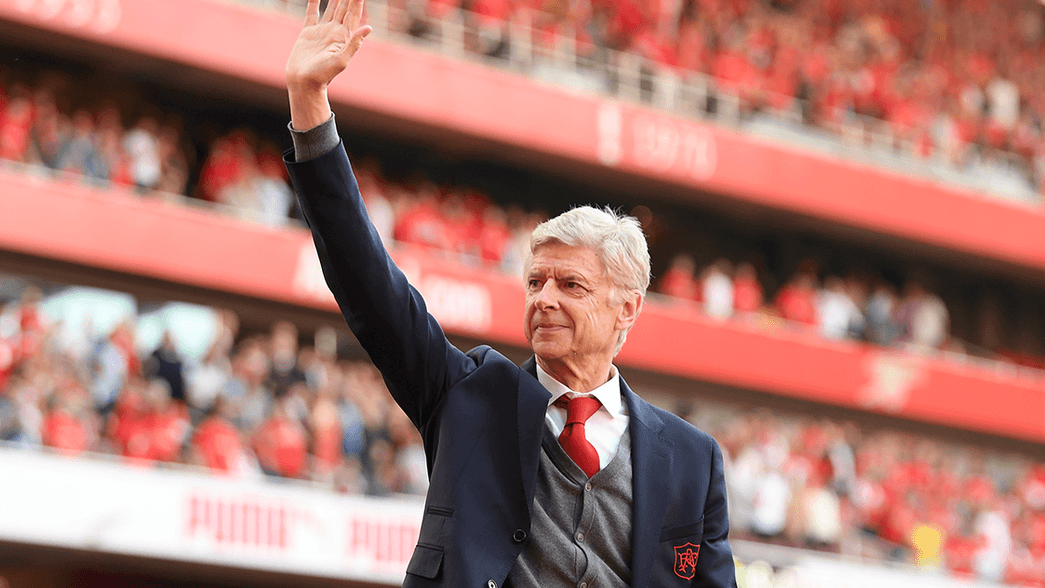After being inducted into the Premier League Hall of Fame, Arsene Wenger reflected on his 22-year tenure as our manager by simply stating: “it changed my life completely.”
The Frenchman was handed the honour having managed more games in the division than any other manager across his 22 seasons as our boss, three of which saw him get his hands on the championship trophy playing some sublime football that changed the way the game was played forever.
His revolutionary coaching methods combined with his eye for bringing in European talent unspotted by his rivals helped the Premier League grow into the most-watched league in the world, but he admits that only a leap of faith from the club at the time made all that possible.
“I was the first foreign manager and completely unknown,” Wenger told the Premier League. “There were a lot of sceptics – a belief that a foreign manager could never be successful in England, but it didn't disturb me. For me, it was a kind of opportunity to show people that I have the level to manage Arsenal Football Club.
“I must say it changed my life completely. I think you cannot be at a big club and not try to give something special to your supporters.”

And that is exactly what Wenger did. After taking the time to assess what he had at his disposal, he gradually implemented ways of working that were completely alien to the domestic game, and by the end of his first full season in charge he had claimed the first of two Doubles during his tenure.
His innovative approach to training, diet and analysis helped to improve a squad of steely English veterans which blended seamlessly with a mix of continental players to create a style of play that English football had never seen before.
“When I arrived in 1996, I thought, ‘let's see how big is the gap between Manchester United and us - and after, we'll try to correct that,’” he said. “I inherited a team where 90 per cent of the players were over 30 years old. It was a team of typical English fighters who had gone through a lot together and had a great team spirit.
“I wanted to change their training methods. At the time, you had no mannequins in England. There were zero analysts. England has adapted very well to the evolution of the game. Those ideas about analysis of the physical performance of the players started at our club.
"If you have the best players in the world, you have an obligation to be as good as you can be"
“We decided to buy Patrick Vieira because I always liked him. In fact, when I called him, he was in Amsterdam to sign for Ajax. He was signing the contract a few hours later. I could divert him to take the plane the next morning to go to London and sign for Arsenal.
“I could take Petit and then, one year later, Thierry Henry. And then we became a force: Bergkamp, Henry, Petit, Vieira, Overmars. plus the old English guard at the back who were ready to fight and were very intelligent defenders. So that created a good balance in the team.”

The zenith of Arsene’s time in north London was during the 2003/04 campaign when our Invincibles remained unbeaten through their 38-game season. He believes his constant strive for perfection resonated with the squad, who had initially believed he was setting standards too high.
However, Wenger believes that by pushing them to strive for a target that seemed unobtainable gave our players even more hunger to achieve immortality.
“If you have the best players in the world, you have an obligation to be as good as you can be,” Wenger mused. “That is the real competition. Winning is not enough. The obligation of perfection is the most important thing for me.
“|If you win the championship [as we did in 2001/02], you always think that you could have done it without losing those games. So I felt that I needed to find a new motivation for the players, to push harder and see how good we could be.
"I’d like to be known as someone who loved Arsenal"
So, I set that target to the players and in 2003 but we lost at home. I said to the players: ‘What happened?’ and they replied: ‘It’s because you set us an impossible target.’ These are the moments where you could sit and say: ‘Okay, I’ll cave in now. Sorry, I was wrong. Let’s just go out and win the championship’, or you say: ‘No, my friends, I believe you can really do it!’
“And I played poker there and told them: ‘I said that because I’m convinced that you can do it.’ When I look back at it today, at how the whole season went, I believe I was crazy! I believe a little bit that your craziness can kill you, but as well your craziness can make you achieve remarkable things.”
After 22 years in our dugout, Arsene departed in 2018 have transformed the club forever, and when he looks back at his tenure, he rightly feels a great sense of pride in the hard work he put in to drive us to great heights.
“I was faithful to the club, and I gave it all for the club,” he reflected. “When I left, I had pride that the club was in that position, with money in the bank, a great stadium, a great training centre, and we won many trophies as well.
“I’d like to be known as someone who loved Arsenal, who respected the values of the club and left it in a position where it can grow and become even bigger.”
Copyright 2025 The Arsenal Football Club Limited. Permission to use quotations from this article is granted subject to appropriate credit being given to www.arsenal.com as the source.




